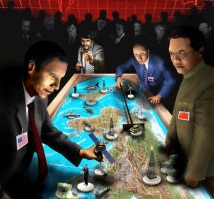Making Peace, Not War, In Games

Eversim’s “Rulers of Nations”
via PAXsims
Editor’s note: The latest issue of Simulation & Gaming is all about using games to reduce violence and promote peace in today’s world. We are pleased to welcome Rex Brynen of McGill University and Gary Milante of the World Bank, who authored the Guest Editorial, “Peacebuilding With Games and Simulations.”
We were delighted to be asked to put together a special symposium on “peace-gaming” (as opposed to war-gaming) in Simulation & Gaming. Our interest in this area comes from our own experiences using games in  teaching and we know there are lots of others using gaming to teach peacebuilding techniques. At the World Bank, Gary uses the CARANA simulation used to teach World Bank staff the skills necessary for assessment, strategic planning, prioritization, and program design in conflict-affected and fragile states. And at McGill, Rex uses the annual BRYNANIA civil war role-playing simulation and other games to teach undergrad and grad students. Together we also coedit the PAXsims blog on conflict simulation, which brings together game-designers, users, students, and practitioners.
teaching and we know there are lots of others using gaming to teach peacebuilding techniques. At the World Bank, Gary uses the CARANA simulation used to teach World Bank staff the skills necessary for assessment, strategic planning, prioritization, and program design in conflict-affected and fragile states. And at McGill, Rex uses the annual BRYNANIA civil war role-playing simulation and other games to teach undergrad and grad students. Together we also coedit the PAXsims blog on conflict simulation, which brings together game-designers, users, students, and practitioners.
 We really enjoyed the breadth of proposals and submissions we received for the special symposium because they reflect a wide spectrum of how gaming can be used to learn about peace-building in the classroom (virtual or otherwise). It was interesting to see how people interpreted our original call for proposals – we discuss this a bit in our overview piece. For example, there are good examples of how games are used to teach conflict management and resolution skills and how these games are used to teach about actual conflicts and current affairs. There are very abstract games that reduce these complex problems into simple quandaries that can be played in a few hours and complicated peacegames that can last for multiple sessions. There are online games and tabletop games, using pen and paper. This reflects a lot of the creativity used to convey complex concepts through these games.
We really enjoyed the breadth of proposals and submissions we received for the special symposium because they reflect a wide spectrum of how gaming can be used to learn about peace-building in the classroom (virtual or otherwise). It was interesting to see how people interpreted our original call for proposals – we discuss this a bit in our overview piece. For example, there are good examples of how games are used to teach conflict management and resolution skills and how these games are used to teach about actual conflicts and current affairs. There are very abstract games that reduce these complex problems into simple quandaries that can be played in a few hours and complicated peacegames that can last for multiple sessions. There are online games and tabletop games, using pen and paper. This reflects a lot of the creativity used to convey complex concepts through these games.
We hope that the symposium gives a good overview of the current state of knowledge on this topic. We are at an interesting crossroads, in a sense, in that the the practice is deciding whether to embrace the high tech approaches of online platforms and virtual worlds, in which there can be a lot of computational power or the “low tech” approaches of “in person” gaming which can provide a lot of insights, but don’t deliver the bells and whistles or, admittedly, the immersive scale that virtual platforms can offer. We may be biased, but hopefully we’ve done the whole spectrum justice in the symposium and look forward to seeing the discussion and research that follows out of it.
Click here to access the Guest Editorial, “Peacebuilding With Games and Simulations,” in the latest issue of Simulation & Gaming.
 Rex Brynen is a professor of Political Science at McGill University, and author, editor, or coeditor of 11 books on conflict and development in the Middle East. He is coeditor of the PAXsims website on conflict simulation (http://www.paxsims.org).
Rex Brynen is a professor of Political Science at McGill University, and author, editor, or coeditor of 11 books on conflict and development in the Middle East. He is coeditor of the PAXsims website on conflict simulation (http://www.paxsims.org).
 Gary Milante, PhD, is an economist for the World Bank working on various aspects of development in the presence of conflict and fragility, and has co-led development of the CARANA simulation used in operations courses at the Bank. He is coeditor of the PAXsims website on conflict simulation (http://www.paxsims.org).
Gary Milante, PhD, is an economist for the World Bank working on various aspects of development in the presence of conflict and fragility, and has co-led development of the CARANA simulation used in operations courses at the Bank. He is coeditor of the PAXsims website on conflict simulation (http://www.paxsims.org).



























































































